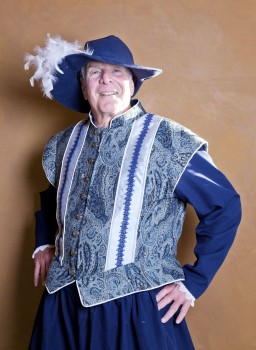Roads Taken and Not Taken: Richard Lederer '59

Richard Lederer '59
Details
In my senior year at West Philadelphia High School, I read my first and only Shakespeare play, Julius Caesar, and I understood scarcely a word of it. What's with the language that begins with a capital letter on each line and doesn't reach the right margin? What's with the strange music that suffuses those lines? What's all this stuff about ancient Rome?
I entered Haverford as a pre-med but found I was reading the science textbooks for their literary value. Just in time, I became an English major, got shot through by the Shakespeare canon, and discovered how literature can catch and crystallize the human condition and sing to us of what we did not know we knew. Ever since, I have been caught in the loom of literature and the web of words.
Haverford College inspired me to discover who I was and why I was put on this planet. Haverford showed me that I must not waste my sweetness on the desert air. That's why I walked away from Harvard Law School after a single year, and, ultimately, from teaching at St. Paul's School, a church boarding school in New Hampshire, where the children I taught in the morning I coached in the afternoon and tucked into bed at night.
While at St. Paul's, I commuted to the University of New Hampshire and earned a Ph.D. in linguistics. During that bright journey, I experienced the emotions of the male dancer in A Chorus Line who goes to his sister's dance recital and yawps,“I can do that! And I want to do that!” So after 27 rewarding years, I left teaching utopia to become a fly-by-the-roof-of-themouth user-friendly linguist, wizard of idiom, Conan the Grammarian, and Attila the Pun. That identity has helped me obliterate the distance between who I am and what I do. When you are heels over head in love with what you do, you never work a day in your life.
Haverford instilled in me a psychic mobility that persists to this very day. For decades, wordstruck, wordaholic, wordbesotted, word-bethumped I have written about all matters linguistic—from puns to punctuation, pronouns to pronunciation, diction to dictionaries, and palaver to palindromes. But when I passed through the portal of my biblical threescore years and ten, I reinvented myself as a writer, finding new subjects to explore—dogs, cats, teachers, seniors, holidays, and Americana. Each time I set up shop in a new territory, I became the writer best suited to tell that particular story, a new human being with a new voice.
Two of my children have won millions of dollars as professional poker players. For the past 15 years they have inspired me to play a lot of Texas Hold'em in neighborhood games. My poker buddies and I have become a band of brothers and sisters who agree that each will vie to be cleverer, gutsier, and sneakier than the others.
I'm energized by the competition of poker. I like feeling the way I felt back in my Haverford youth on the football field and basketball court. I no longer can play those sports, but when I compete in mental games, age doth not whither me nor custom stale me. I can never drive a golf ball like Tiger Woods or pulverize a tennis ball like Serena Williams; but I can, on occasion, make a stone-cold bluff in the manner of my offsprung poker sharks. Not having inherited my kids' awesome analytical acumen, I am not a natural numbers guy; but I claw my way upward toward mediocrity. That progress blossoms my axons, dendrites, synapses, and ganglia, expanding my brain's breadth. A man's mind should exceed his reach, or what's a heaven for?
Now that I am full of years and white of hair and the evening star glows in the sky, now that my sere, my yellow leaf falls from bare, ruined choirs where late the sweet birds sang, now that I am well past my biblical threescore years and ten and my son has (gasp!) turned 50, now that I am on the cusp of returning for my 55th reunion and the Haverford alumni notes often start several years after my class, I find myself filled with one overmastering emotion:
Gratitude—for family, which now embraces seven grandchildren; for enduring friendships with classmates; for a lifelong addiction to learning; for the marvel that, as my readers pass their eyes over my words, they experience ideas and emotions similar to what I was thinking and feeling when, in another place and another time, I struck the symbols on my keyboard; and for the astonishing gift of life: what it has been and what it will become. Hurrah!
Richard Lederer (verbivore.com) is the author of more than 40 books about language, history, and humor, including his current titles, Amazing Words and Lederer on Language. He lives in San Diego with his wife, Simone van Egeren. Lederer gave a talk titled“Confessions of a Word Lover” during Alumni Weekend 2014 at Haverford.



